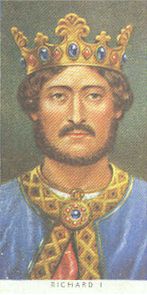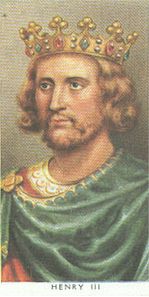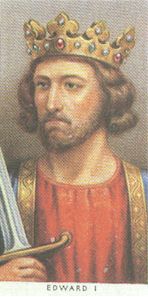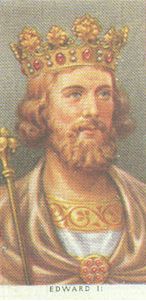Our Territories
Channel Islands
England
Ireland
Isle of Man
Scotland
Wales
Our Categories
Home | Set 1 | Set 2 | Set 3 | Set 4 | Set 5 | Set 6 | Set 7 | Set 8 | Set 9 | Set 10
 |
Richard I Fighting was the breath of life to Richard Lionheart, and the Third Crusade appealed to his romantic piety. In the Holy Land he performed miracles of valour, but failed to capture Jerusalem. His personal magnificence, and the gorgeous pageantry of his quest, caught the imagination of Europe. When a treacherousally threw him into prison, the ransom money was raised in England and France. Fond of wine, women and song, Richard cared little for state-craft, and would sell any office to raise money for his interminable exploits on the Continent. He died from an arrow-wound, far from the Kingdom which he had so seldom visited. |
 |
John John Lackland was the youngest son of Henry II. Short and fat, he envied his splendid brother, Richard I whom he succeeded. When he became King, John Divorced his wife and married Isabella of Angouleme, a girl of about thirteen. John soon relapsed into sloth and self-indulgence. Plundering the rich, oppressing the poor, he roused all men against him. The Pope excommunicated him; the barons forced him to accept Magna Carta. He died from over-eating-a fugitive from his enemies. Though clever, John was cruel and completely selfish; he has been termed the "worst English king." |
 |
Henry III Henry succeeded his father, John, at the age of nine. Brought up by priests he became devoted to church art and learning. Henry proved a weak ruler, dominated by churchmen and by his wife's French relations. Large sums were spent on expeditions to France and on church-building (notably at Westminster). Constant demands for money provoked the barons to rebel, and, led by Simon de Montfort, they gained control. Prince Edward rallied the royalists and reinstated his father. Henry was personally an agreeable fellow-fond of good company, music and poetry. He had all the private virtues, but lacked statesmanship. |
 |
Edward I Edward Longshanks, called "The English Justinian" for his legal reforms, was also a great warrior. Aiming at a united Britain, he defeated the Welsh chieftains, and created his eldest son "Prince of Wales." He was known as "the Hammer of the Scots" for his victories in Scotland, and brought from Scone to Westminster the famous coronation stone. He died on the way to fight Robert Bruce. Edward was an athlete and loved tournaments. He married twice; when his first wife died, he escorted her remains from Grantham to Westminster, setting up at every halting-place "Eleanor Crosses," some of which still stand. |
 |
Edward II Edward II, who cared nothing for battles or tournaments, politics or business, spent his youth idling with Piers Gaveston; pitch and toss was his favourite game. He allowed many abuses to creep back into government, and made a ludicrous show at Bannockburn, where the English army was routed by the Scots. Amiable but weak-willed, Edward always relied on favourites. After Gaveston had been hanged, he clung to the Despensers. He offended his wife, who joined her lover Mortimer in deposing him; by their orders Edward was murdered in Berkeley Castle. His beautiful tomb in Gloucester Cathedral was erected by his son, Edward III. |
Home | Set 1 | Set 2 | Set 3 | Set 4 | Set 5 | Set 6 | Set 7 | Set 8 | Set 9 | Set 10